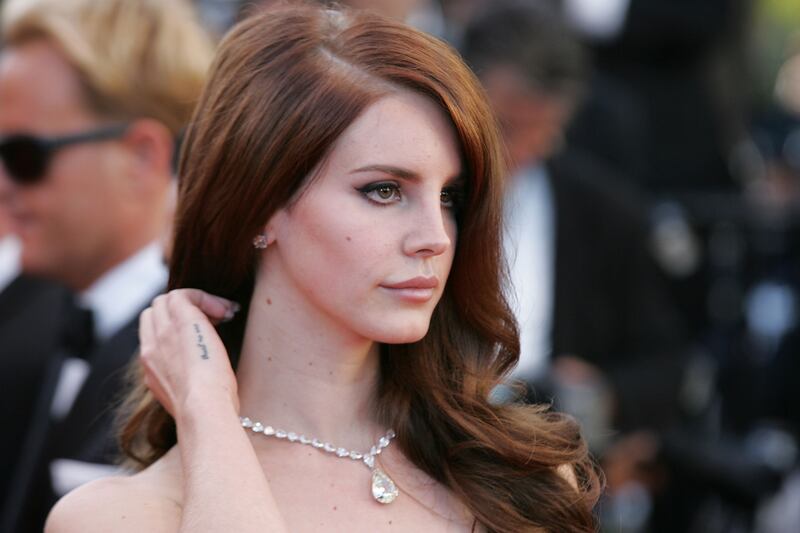Lana Del Rey is inauthentic. No one has any reason to dispute this. Del Rey, who is currently doing a media blitz to publicize her new album, Ultraviolence, hasn’t taken any pains to hide that her current persona of glamorous eccentricity was manufactured to move records. Even if she wanted to, the press certainly won’t let Del Rey hide her previous, unsellable incarnation as a blonde named Lizzy Grant, but she’s embraced it by releasing material that she recorded under that name with a cheeky wink at the changes she’s undergone, including dying her hair and augmenting her pout. Del Rey knows that you know she’s made herself up to be “Lana Del Rey,” the self-described “gangster Nancy Sinatra,” and she doesn’t seem to care too much. Nor do fans, it seems, who love Del Rey as is and snatch up her albums by the bucketload.

But there are people out there who do seem to care, very much in fact, that Lana Del Rey constructed her image instead of rolled into this world as a “natural” chanteuse. Ever since Lizzy Grant became “Lana Del Rey,” there’s been a breed of music critic that can’t help but throw shade in her direction for her alleged inauthenticity—shade that often has uncomfortable gendered nastiness in it to boot. The New York Times’ Jon Caramanica suggested she “wash off the face paint” and Pitchfork called her record a “faked orgasm,” leaning on strangely antiquated fears of female mendacity to castigate Del Rey for her studied attempts at dark glamour.
It’s all very strange since, outside of criticisms of Lana Del Rey, angst over authenticity largely evaporated from the world of pop music criticism around the same time that rock music stopped dominated the charts, i.e. sometime in the ’90s. In the ’90s, swiping at Alanis Morissette for her change from teen pop singer to pseudo-gritty rock musician may have felt culturally relevant, but since then, inauthenticity has stopped being a shameful thing and now is worn as a badge of pride. Beyoncé likes to draw attention to how much work it takes to be so perfect, so much so that it’s immediately understood as a joke when she says she “woke up like this.” Lady Gaga regards plasticity as closer to her true face than the one she wore when she was a humble songwriter named Stefani Germanotta. The audience is in on the joke. The audience knows that we’re being sold a fantasy, and we don’t need comforting lies telling us otherwise.
Of course, the big difference with Del Rey is she takes a bunch of signposts that tend to signal a kind of hip authenticity—a cool and dark beauty, a languid manner, a slightly French-ified nostalgia—and sells them back to the audience as a self-aware kind of artifice. Which, in turn, suggests that perhaps what the hipster crowd thinks of as “authentic” is just another form of image-making, one that takes pains to hide itself more than others, but is still just as artificial. None of us actually woke up like this, not even the most painfully hip amongst us.
God knows the fans seem to love Lana Del Rey, even as she irritates aging music critics who cling to their deluded attachment to the concept of authenticity. As Kelsey McKinney of Vox demonstrated last week, the more that music critics complained that they were being sold an inauthentic bill of goods with Del Rey’s music, the more popular Del Rey got with people out there actually buying records. Not only do audiences not care if Del Rey’s studied stance of sleepy hipness is just a pose, they seem to like her more for it.

This tension goes a long way to explaining why Del Rey attracted so much controversy over her remarks to Guardian journalist Tim Jonze. Del Rey mentioned her admiration of both Kurt Cobain and Amy Winehouse and added, “I wish I was dead already.” When Jonze pressed her, asking if she was talking about “early death as glamorous”—implying that she wanted to die early to improve her public image—she seemed to go along, saying, “I don’t know. Ummmm, yeah.”
Del Rey publicly complained and suggested the Guardian was exploiting her, but it was too late for that. The remarks were yet another example of how inauthentic and constructed Del Rey’s persona is. They seemed downright callous, in fact, as Winehouse and Cobain were, after all, real people whose deaths are not experienced by their families as some kind of glamorous marketing campaign, but a very real and tragic loss. Cobain’s daughter, Frances Bean Cobain, denounced the remarks, reminding everyone that the “cool” death of her father “isn’t something to romanticize.” Cobain then deleted that tweet and clarified that she wasn’t “attacking” Del Rey, but that she wanted to offer “perspective from personal experience.”
Cobain’s perspective is valuable, of course, but it’s also understandable why she would soften her stance. Del Rey’s remarks, while insensitive, were also rooted in an uncomfortable truth: Young death is romanticized, particularly in rock music, in no small part because it adds an air of authenticity to an artist’s image. Kurt Cobain is one of the models of the kind of rock authenticity that Del Rey is compared to and found wanting. In a way, it makes sense. After all, his songs did reflect his personal experience of sadness and his death was, of course, quite real. But it’s also true that his authenticity has been bundled up, packaged as a True Rock Experience®, and sold to the public as product. Early death is glamorous. It does sell records. Ask anyone who is cashing checks earned by Janis Joplin, Jimi Hendrix, or Tupac if you have any doubts about that.
The whole debacle demonstrates why it’s such a problem to put “authenticity” up on a pedestal, and why the current trend toward celebrating artifice is such a relief. When audiences clamor for a fantasy of authenticity, it becomes inevitable that people’s real addictions, mental health problems—and yes, deaths—get packaged and sold. That these problems are real doesn’t mean that people aren’t still buying an image created from those deaths to sell records.
But in celebrating artifice, we in the audience can shield ourselves from needing people to suffer for real in front of us in order to convince ourselves of their authenticity. We can enjoy the construct of death or sadness without demanding that our artists actually be sad—or worse, actually be dead—in order to make it feel more real. After all, it’s not the authenticity of an artist’s work that really matters in the end, but how it makes us feel. And unlike a musician’s image constructed to sell records, those feelings we have are always assured to be 100 percent authentic.





